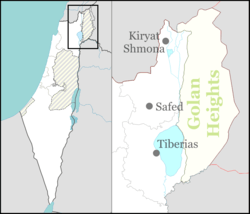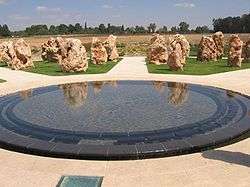She'ar Yashuv
| She'ar Yashuv שְׁאָר יָשׁוּב | |
|---|---|
|
Memorial for the helicopter disaster | |
 She'ar Yashuv | |
| Coordinates: 33°13′34.68″N 35°38′47.75″E / 33.2263000°N 35.6465972°ECoordinates: 33°13′34.68″N 35°38′47.75″E / 33.2263000°N 35.6465972°E | |
| District | Northern |
| Council | Mevo'ot HaHermon |
| Affiliation | HaOved HaTzioni |
| Founded | 1940 |
| Founded by |
HaNoar HaTzioni and HaOved HaTzioni members |
| Population (2015) | 644[1] |
She'ar Yashuv (Hebrew: שְׁאָר יָשׁוּב) is a moshav in northern Israel. Located in the Upper Galilee in the northeastern Hula Valley, it falls under the jurisdiction of Mevo'ot HaHermon Regional Council. In 2015 it had a population of 644.
The moshav came to public awareness after the 1997 Israeli helicopter disaster, when two IDF helicopters collided in midair above the settlement, killing 73 people on board.
History
She'ar Yashuv was first founded in February 1940 as part of the Ussishkin fortresses by 30 families from the HaNoar HaTzioni ("Zionist Youth") and HaOved HaTzioni ("Zionist Workers"). It was originally called Metzadot Ussishkin Gimel, lit. "Ussishkin Fortresses 3", before being renamed Aleh Reish ("Go Up, Take Possession"). The present name is taken from the Book of Isaiah 10:21 ("A remnant will return, (the remnant of Jacob)").
When the battles of the 1948 Arab–Israeli War ended and a ceasefire was declared at the end of 1948, most of the inhabitants abandoned the community because of artillery shells fired by Syria from Tel Azaziat, which overlooks the village from the east. In 1949 it was resettled by remnants of the original community. This time, by members of HaNoar HaTzioni from Hungary who survived the Holocaust and had come to Israel during the war. After the war it also gained some land that had belonged to the depopulated Arab village of al-Mansura.[2]
The Syrians shot at the settlers for 19 years from Tel Azaziat, and in 1957 killed Yosef Ben-Haim, a member of the moshav. During the second day of the Six-Day War, the Syrians tried to capture She'ar Yashuv. Radio Damascus and the French daily Le Monde even announced that the moshav had been captured by the Syrians. However, a few of the defenders who stood steadfastly chased away the Syrians with mortar fire. The Syrians returned to attack the moshav a number of times, but did not succeed to capture it. On 9 June 1967, fighters of the Golani Brigade captured Tel Azaziat and removed the immediate Syrian danger from the moshav. Israel kept the conquered Golan Heights and the new cease-fire line is much farther east than the one from 1948.
During the 1970s and 1980s Katyusha rockets launched by Lebanese terrorists caused property damage in the moshav.
Places of interest
On the south end of the moshav are remnants of al-Mansura with a flour mill.
The "Forest of the Fallen" is located on the southeast edge of the moshav. In the forest are 73 trees planted in memory of the 73 victims of the helicopter crash that occurred on 4 February 1997 above She'ar Yashuv and nearby kibbutz Dafna.
On the east side of the moshav flows the Banias stream, one of the main headwaterss of the Jordan River.
References
- ↑ "List of localities, in Alphabetical order" (PDF). Israel Central Bureau of Statistics. Retrieved 16 October 2016.
- ↑ Khalidi, Walid (1992), All That Remains: The Palestinian Villages Occupied and Depopulated by Israel in 1948, Washington D.C.: Institute for Palestine Studies, p. 474, ISBN 0-88728-224-5
